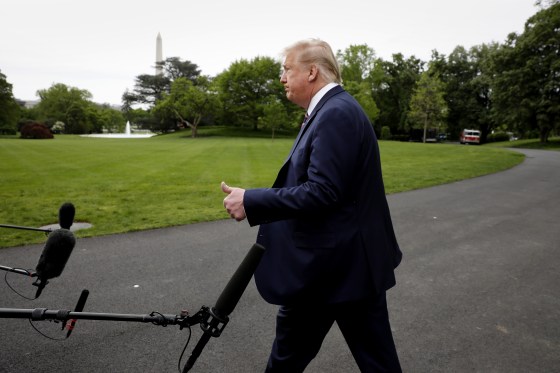Donald Trump famously said as a candidate in 2016 that he could shoot someone on Fifth Avenue without consequences. His lawyer echoed that wild claim last fall, telling an appellate court that Trump, while president, could not be prosecuted for such a shooting.
That outrageous assertion was not repeated Tuesday in the Supreme Court.
In more than three hours of spirited oral argument, not a single justice questioned whether the court had the authority to compel President Trump's accountants and bankers to comply with subpoenas for his business records and tax returns issued by the House of Representatives and a New York state grand jury.
But whether the court will decide that the subpoenas are compelling remains a mystery, given that the partisan 5-4 split between conservative and liberal members of the court presented itself regularly during the lengthy session.
Conservative justices voiced — as was expected — concerns about whether such investigations would be harassment or would undermine the constitutional duties of a president, echoing arguments by the Trump's lawyers. Meanwhile, the liberal justices questioned whether Trump is entitled to a special protection afforded no one else: having the court prevent any investigation of his business affairs that occurred while he was a private citizen.
While Trump's personal lawyers urged the Supreme Court to confer upon Trump broad immunity on the basis that the subpoenas would encroach on his singular role as president, Justice Department lawyers simply sought to block the subpoenas on the narrower grounds that neither Congress nor the New York prosecutor had proven a special need for Trump's documents. Solicitor General Noel Francisco urged the court not to address the immunity issue at all and to find instead that the prosecutor had failed to show that the information was vital and could not be obtained elsewhere.
Still, conservative justices seemed to see the existence of burdens on the president and the potential of harassment, as Trump's personal lawyer Jay Sekulow argued. He repeatedly warned that "2,300 state prosecutors" nationwide had subpoena power, raising the specter of mass harassment of the president — and thus the presidency — if the court required Trump's accountants and banks to obey the subpoenas. Justice Stephen Breyer seemed to challenge that premise, noting that the court required President Bill Clinton to give a sworn deposition in a civil lawsuit and that "millions" of people could bring civil lawsuits, perhaps all unfounded, against a sitting president but had not.
And while grand jury materials are secret, Justice Samuel Alito observed that prosecutors leak secret grand jury materials to journalists. Carey Dunne, representing the New York prosecutor, Cyrus Vance, rejected that premise, noting that reporters ask but prosecutors regularly refuse to divulge documents (such as tax returns) provided to a grand jury.
The premise that Trump's financial information should remain secret because prosecutors would commit the crime of disclosing grand jury material to the media reflects a deep cynicism that Trump is a victim of a partisan vendetta and, as a result, is entitled to special protection. Rest assured that few, if any, judges would be receptive to an identical argument made by anyone else.
Beyond the arguments related to the special nature of Trump himself, Chief Justice John Roberts expressed concerns about the breadth of the congressional subpoenas — which came from three committees — and asked whether the court should probe the intent of Congress, a highly unusual step. Moreover, Douglas Letter, the attorney representing the House, pointed out that the House Intelligence Committee, which had investigated foreign influence in the 2016 election, sought financial records to see whether Trump was subject to foreign leverage.
He also argued that Congress was justified in issuing the subpoenas to help decide whether new legislation is needed — and Justice Clarence Thomas challenged Letter to identify any topic that could not be a subject of future legislation and therefore not justify a subpoena to a president, contending that Letter's argument did not limit Congress at all.
Two prior Supreme Court opinions, of course, held center stage in the arguments, one from a Republican administration and the other from a Democratic administration. The first was the Supreme Court's 8-0 decision in 1974 ordering President Richard Nixon to produce his White House tapes in response to the special prosecutor's trial subpoena, which led to Nixon's resignation. The second was the court's unanimous order in 1997 for Clinton to provide evidence in a civil lawsuit brought by Paula Jones in relation to conduct before he was elected president.
Lawyers for Congress and the prosecutor stressed that, unlike in the tapes battle with Nixon, Trump has never claimed executive privilege as a defense and that he could not do so, because the subpoenas seek personal and corporate financial documents unrelated to his status as president. And, unlike in the Clinton case, the subpoenas would be binding on Trump personally but would not make demands of him personally; they ask that third parties comply, setting potentially new precedents.
Reading the tea leaves, the Supreme Court will assuredly reject the claim of absolute immunity from legal process advanced by Trump's lawyers — but it does not appear to be completely above protecting him from either the long arm of the law or from oversight by Congress for his actions before he was elected. Still, whatever the Supreme Court decides about Trump, Justice Elena Kagan's blunt observation Tuesday that the president is not completely "above the law" will ultimately remain intact, just as it did with Nixon and Clinton before him.
CORRECTION (May 13, 2020, 10:53 a.m.): An earlier version of this article misstated the name of the lawyer representing the New York prosecutor's office. It is Carey Dunne, not Casey Dunn.



